 Welcome to Issue 100 of the SUPERIOR BOOK PRODUCTIONS newsletter!
Welcome to Issue 100 of the SUPERIOR BOOK PRODUCTIONS newsletter!
Happy New Year, Everyone!
Few New Year’s Resolutions can be better than to read more. I wish that for all of you, and hopefully, the list of new books below will inspire you to begin.
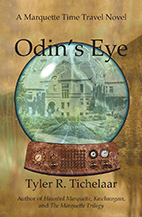 I’m also thrilled to announce that my newest book, Odin’s Eye: A Marquette Time Travel Novel, has been named a U.P. Notable Book on the 5th Annual U.P. Notable Books List, sponsored by the Upper Peninsula Publishers and Authors Association. You can view the full list here at the UPPAA website.
I’m also thrilled to announce that my newest book, Odin’s Eye: A Marquette Time Travel Novel, has been named a U.P. Notable Book on the 5th Annual U.P. Notable Books List, sponsored by the Upper Peninsula Publishers and Authors Association. You can view the full list here at the UPPAA website.
Odin’s Eye has also been chosen as the Community Read by the Marquette Regional History Center. I’ll be giving a presentation about the book, which will be followed by a book discussion, at the MRHC on Wednesday, February 7 at 6:30 p.m. If you live close by, I invite you to attend.
May the year 2024 bring you much joy and happiness and many new favorite books!
Tyler
This Month’s Great Book Quote:
“I declare after all there is no enjoyment like reading! How much sooner one tires of any thing than of a book! — When I have a house of my own, I shall be miserable if I have not an excellent library.”
— Jane Austen
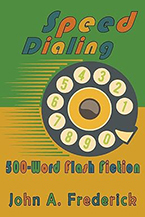 John Frederick’s new book Speed Dialing: 500-Word Flash Fiction is a fascinating departure from Frederick’s previous nonfiction books, Prosperity Now! A 12-Week Journey to The Life of Your Dreams and Paris Histories and Mysteries. In Speed Dialing, Frederick shows an edgier side, one both romantic and somewhat cynical, filled with mystery and the supernatural, and full of insights into life’s meaningful moments and some of its less pleasurable experiences. The twenty stories in this collection are all roughly 500 words long, meaning they can be read quickly, but more importantly, their sparseness and tight style allow for sudden twists at the end that will surprise and please.
John Frederick’s new book Speed Dialing: 500-Word Flash Fiction is a fascinating departure from Frederick’s previous nonfiction books, Prosperity Now! A 12-Week Journey to The Life of Your Dreams and Paris Histories and Mysteries. In Speed Dialing, Frederick shows an edgier side, one both romantic and somewhat cynical, filled with mystery and the supernatural, and full of insights into life’s meaningful moments and some of its less pleasurable experiences. The twenty stories in this collection are all roughly 500 words long, meaning they can be read quickly, but more importantly, their sparseness and tight style allow for sudden twists at the end that will surprise and please.
The opening story, “Speed Dialing,” provides a glimpse into a situation we can all relate to—the irritation of dealing with companies over the phone, their automated systems, and agents who can’t always help us. But this story has a twist. The caller is not only rude to the customer service agent, but he doesn’t deserve to have the extra fee the company charged removed.
While this first story is very much the result of the real world we all live in, others have a supernatural aspect.
To read more, visit Speed Dialing.
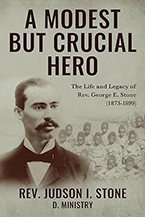 Rev. Judson I. Stone’s new book A Modest But Crucial Hero: The Life and Legacy of Rev. George E. Stone (1873-1899) tells the fascinating story of its author’s great-great-uncle who left the comfort of his life in Mexico, New York, in 1898 to become a missionary in Oman, trying to convert Muslims to Christianity. The Stone family has a long history of service to God, the church, and being missionaries, as evidenced by the author’s own ministerial calling, but his great-great-uncle George Stone was the first in the family to be a missionary.
Rev. Judson I. Stone’s new book A Modest But Crucial Hero: The Life and Legacy of Rev. George E. Stone (1873-1899) tells the fascinating story of its author’s great-great-uncle who left the comfort of his life in Mexico, New York, in 1898 to become a missionary in Oman, trying to convert Muslims to Christianity. The Stone family has a long history of service to God, the church, and being missionaries, as evidenced by the author’s own ministerial calling, but his great-great-uncle George Stone was the first in the family to be a missionary.
Rev. Stone had always known about his great-great-uncle, but only in recent years did he decide to research and learn more about this family member who sought to spread the Gospel of Jesus Christ overseas. Rev. Stone’s research revealed a devout and serious young man who believed God called him to serve in the Arabian Mission in the Persian Gulf region. Extensive research was done by the author who tracked down George’s college records and his letters home and even visited Oman and George’s grave there. Rev. Stone tirelessly documents all his sources and quotes extensively from primary and secondary sources to make George and those he knew and worked with come alive for the reader.
To read more, visit A Modest But Crucial Hero.
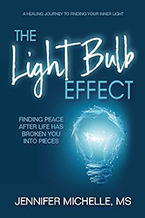 Jennifer Michelle’s new book The Light Bulb Effect: Finding Peace After Life Has Broken You Into Pieces offers a wonderful metaphor for how we can repair our brokenness and begin to spread our light to the world. Jennifer was inspired to write the book after she was tightening a green light bulb in her Halloween decorations and it shattered in her hand. She states, “I saw shards of glass everywhere and a problem that needed to be fixed. Just as that light bulb started out whole with a purpose, so did you. No one in this world is unbroken, but the exciting fact is that in your brokenness, you can find your light, your purpose, and your passion.”
Jennifer Michelle’s new book The Light Bulb Effect: Finding Peace After Life Has Broken You Into Pieces offers a wonderful metaphor for how we can repair our brokenness and begin to spread our light to the world. Jennifer was inspired to write the book after she was tightening a green light bulb in her Halloween decorations and it shattered in her hand. She states, “I saw shards of glass everywhere and a problem that needed to be fixed. Just as that light bulb started out whole with a purpose, so did you. No one in this world is unbroken, but the exciting fact is that in your brokenness, you can find your light, your purpose, and your passion.”
Jennifer plays off the light bulb metaphor throughout the book, even including some history of light bulbs and inspiring quotes from Thomas Edison. All of it is used to help the reader realize that no matter how broken they may feel, they can be repaired. They are stronger than they think, and they can accomplish anything they want. To recover from being broken, we need to embark on a journey that is “intentional, authentic, and filled with vulnerability and self-kindness.” Like Edison who “failed” many times before he succeeded in creating a working light bulb, similarly, we need to embrace failure because it helps us refine our efforts so we can achieve what we want.
To read more, visit The Light Bulb Effect.
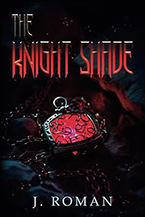 J. Roman’s debut fantasy novel The Knight Shade opens on the brink of apocalypse. A young woman, Morgan, is touring a historical home as her last act of connecting with the way life once was before a mysterious horde will attack. The horde has already been devastating other parts of the planet, and it is now about to descend on Morgan’s town. A local scientist has invented some pills so his neighbors can euthanize themselves before the horde wreaks havoc on their community. Everyone in Morgan’s family has already taken the pills, and now she is the last one alive, trying to savor her final moments of life before ending it all.
J. Roman’s debut fantasy novel The Knight Shade opens on the brink of apocalypse. A young woman, Morgan, is touring a historical home as her last act of connecting with the way life once was before a mysterious horde will attack. The horde has already been devastating other parts of the planet, and it is now about to descend on Morgan’s town. A local scientist has invented some pills so his neighbors can euthanize themselves before the horde wreaks havoc on their community. Everyone in Morgan’s family has already taken the pills, and now she is the last one alive, trying to savor her final moments of life before ending it all.
But things do not go as Morgan plans. As the horde attacks the house, a phantom suddenly appears to protect her and prevent her from taking her own life. Before she knows it, Morgan finds she has been whisked away by the phantom to an underground cavern. J. Roman does a wonderful job of depicting the thoughts that run through Morgan’s mind throughout the book, especially in these early scenes as Morgan learns why she was saved.
To read more, visit The Knight Shade.
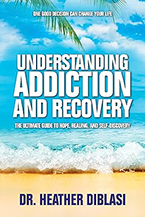 Dr. Heather DiBlasi’s new book Understanding Addiction and Recovery: The Ultimate Guide to Hope, Healing, and Self-Discovery completely lives up to its title as a tremendous resource for anyone who wants a better understanding of addiction in all its forms and what is needed to recover from an addiction.
Dr. Heather DiBlasi’s new book Understanding Addiction and Recovery: The Ultimate Guide to Hope, Healing, and Self-Discovery completely lives up to its title as a tremendous resource for anyone who wants a better understanding of addiction in all its forms and what is needed to recover from an addiction.
The book is divided into nineteen chapters. The chapters discuss how life problems can lead people to dysfunctional behaviors and addiction and how to prevent a substance use disorder (SUD). Dr. DiBlasi then devotes entire chapters to specific types of addiction, ranging from alcohol and marijuana use to hallucinogens and opioids. Her discussion is extensive and includes everything from vaping and gaming to the latest drugs you probably never heard of. She then discusses how to identify behavioral disorders, the psychology behind addiction, what is required to succeed in treatment, and the importance of knowing your self-worth and motivating yourself to make good decisions to break the cycle of addiction.
While Dr. DiBlasi has done extensive research and documents her material, Understanding Addiction and Recovery is not merely an academic book. It is highly readable and provides wonderful insights into addiction and recovery. Dr. DiBlasi knows how to communicate with people from her years of teaching in the classroom and, more importantly, her years working in treatment centers and directly helping people with SUDs.
To read more, visit Understanding Addiction and Recovery.
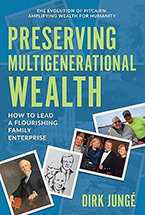 Preserving Multigenerational Wealth: How to Lead a Flourishing Family Enterprise is the legacy work of Dirk Jungé, a fourth-generation member of the wealthy Pitcairn family. The Pitcairn wealth began with John Pitcairn, a Scottish-born American industrialist who founded Pittsburgh Plate Glass Company, now PPG Industries, in 1883. Since then Pitcairn’s descendants have been growing and sustaining the wealth their ancestor created.
Preserving Multigenerational Wealth: How to Lead a Flourishing Family Enterprise is the legacy work of Dirk Jungé, a fourth-generation member of the wealthy Pitcairn family. The Pitcairn wealth began with John Pitcairn, a Scottish-born American industrialist who founded Pittsburgh Plate Glass Company, now PPG Industries, in 1883. Since then Pitcairn’s descendants have been growing and sustaining the wealth their ancestor created.
In 1987, Dirk Jungé, a chartered financial analyst (CFA), took the lead in the family business in transitioning it from focusing solely on growing and preserving the Pitcairn family’s wealth to also serving as a consulting agency to other wealthy families to help them avoid the pitfalls the Pitcairn family experienced and also preserve their own wealth. The family ended up reconstituting its old family office as a private trust company, Pitcairn Trust Company, which has since helped a hundred-plus multigenerational families with preserving their wealth.
In this book, Jungé shares the practices he has already shared with numerous clients. His goal is “to pass on to you and your family some habits that can become rituals for your family and, as a result, create, build, sustain, and preserve multigenerational wealth.”
To read more, visit Preserving Multigenerational Wealth.

